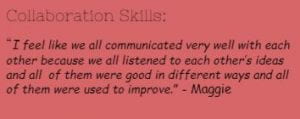In our year-long effort to “Respond to Racism,” fourth-grade students focused their attention on the effects of Zero Tolerance practices on African American students; particularly how these practices contribute to the school-to-prison pipeline. To determine if and how African American students at Lyles-Crouch experienced these practices, they created a survey which was administered to the upper grade African American students, and used the results to inform the PTA of the racial atmosphere at our school. In order to begin Creating a New Narrative, the results of the survey, along with quotes from the students who took the survey, and information about the school-to-prison pipeline were shared on a website we created with other relevant information needed to better understand the African American community. Finally, students

participated in silent protest marches in Alexandria letting their signs inform the public of the need for change.
Teacher: Arlette Yonkers
Students: Fourth-grade students at Lyles-Crouch Traditional Academy
Driving Question: How have African American students experienced racism in our community and how can we tell their stories?

Standards of Learning: English Language Arts
The student will:
- use effective oral communication skills in a variety of settings, (4.1)
- create and deliver multimodal, interactive presentations, (4.2)
- learn how media messages are constructed and for what purposes,(4.3)
- will read and demonstrate comprehension of nonfiction texts, (4.6)
- will write in a variety of forms, (4.7)
- will demonstrate comprehension of information resources to create a research product, (4.8)
- demonstrate skills for historical thinking, geographical analysis, economic decision making, and responsible citizenship, (VS.1)
- collect, organize, and represent data in bar graphs and line graphs, and (4.13a)
- interpret data represented in bar graphs and line graphs. (4.13b)
The 5Cs:
Critical Thinking
- Connecting the past to the current problem
- Coming up with new ideas to solve a problem
- Finding useful information
- Trying to understand what they’ve learned and still need to know.
Collaboration
- Working with others in small groups
- Accepting different ideas
 Learning from others
Learning from others- Making decisions together
- Taking responsibility for their own work and allowing others to be responsible for theirs
Communication
- Actively listening to others with an open mind
- Respectfully speaking to others
- Sharing information by speaking, writing, and mult-media applications
- Asking questions and sharing ideas
- Praising and motivating our peers
- Including the ideas and opinions of others into our project
Creative Thinking
- Creating new ideas from our strengths

- Making changes to improve our ideas
- Communicating our ideas to others
- Persevering through challenges
- Discovering ways to make ideas understood by others
Citizenship
- Recognizing our responsibility to promote safe, legal and ethical behavior
- Understanding what we can do as citizens to address an issue
- Conducting research that uses a wide range of sources
- Developing well supported solutions to an issue
- Taking action based off of research and collected information